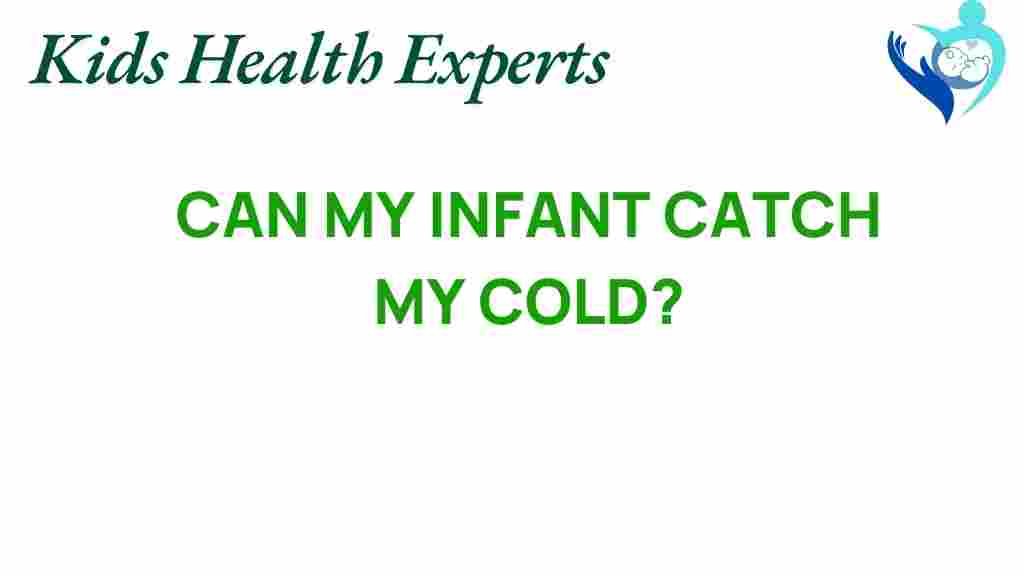Can My Infant Catch My Cold? Here’s What You Need to Know About Infant Health
As a parent, it’s natural to worry about your infant’s health, especially when you’re feeling under the weather. One common concern is whether your cold can be transmitted to your child. In this article, we’ll explore the relationship between adults’ colds and infant health, discuss the common cold, and provide valuable parenting tips to help you keep your baby safe and healthy.
Understanding the Common Cold and Infant Health
The common cold is a viral infection that affects the upper respiratory tract. While it is usually mild in adults, infants can be more susceptible to complications due to their developing immune systems. Understanding how respiratory infections like the common cold can affect your baby is crucial for illness prevention and baby care.
How Do Colds Spread?
Colds are primarily spread through:
- Direct contact: Touching surfaces contaminated with the virus and then touching your face.
- Aerosols: Inhaling droplets that are expelled into the air when an infected person coughs or sneezes.
- Close contact: Kissing, hugging, or other close interactions with an infected person.
Can Infants Catch Colds from Adults?
Yes, infants can catch colds from adults. However, the severity of the illness may vary. Here are some important factors to consider:
- Age: Newborns and younger infants (especially those under 6 months) are at a higher risk for severe symptoms.
- Immune System: Infants have underdeveloped immune systems, making them more vulnerable to respiratory infections.
- Previous Health Issues: Babies with underlying health conditions may be at greater risk for complications.
Boosting Your Infant’s Immune System
While you can’t completely shield your baby from colds, there are several strategies to help boost their immune system:
- Breastfeeding: If possible, breastfeed your baby. Breast milk contains antibodies that can help protect against infections.
- Healthy Diet: Once your baby starts eating solids, provide a variety of fruits and vegetables rich in vitamins and minerals.
- Proper Hygiene: Wash your hands frequently and keep your baby’s environment clean to minimize germ exposure.
- Vaccinations: Keep your baby’s vaccinations up to date to prevent severe illnesses.
Parenting Tips for Managing Colds in Infants
Here’s a step-by-step approach to managing your infant’s health during a cold:
Step 1: Monitor Symptoms
Keep an eye on your baby’s symptoms. Common signs of a cold in infants include:
- Runny or stuffy nose
- Coughing
- Sneezing
- Irritability or fussiness
- Difficulty sleeping
Step 2: Provide Comfort
When your baby has a cold, their comfort is paramount. Here are some ways to provide relief:
- Hydration: Ensure your baby stays hydrated with breast milk or formula.
- Saline Drops: Use saline nasal drops to relieve nasal congestion.
- Humidifier: Consider using a cool-mist humidifier in your baby’s room to ease breathing.
Step 3: Consult Your Pediatrician
If your baby shows severe symptoms or if you’re concerned about their health, consult your pediatrician. Signs to watch for include:
- High fever (above 100.4°F or 38°C)
- Persistent cough or wheezing
- Difficulty breathing
- Refusal to eat or drink
Troubleshooting Common Concerns
As a parent, you may face various challenges during your infant’s cold. Here are some troubleshooting tips:
What If My Baby Refuses to Eat?
It’s common for infants to lose their appetite when they’re sick. Here’s what you can do:
- Offer smaller, more frequent feedings.
- Ensure they stay hydrated.
- Try different feeding positions if they’re uncomfortable lying down.
How Can I Prevent Spreading My Cold to My Baby?
To minimize the risk of spreading your cold, follow these tips:
- Wash your hands frequently, especially before handling your baby.
- Avoid close contact like kissing or cuddling while you’re symptomatic.
- Use tissues when sneezing or coughing, and dispose of them immediately.
When Should I Seek Medical Help?
If you notice any of the following, seek medical help:
- Your baby is less than 3 months old and has a fever.
- Signs of dehydration (e.g., fewer wet diapers).
- Unusual lethargy or irritability.
Conclusion: Prioritizing Infant Health
While your infant can indeed catch your cold, being proactive about their health can help minimize risks associated with respiratory infections. By boosting their immune system, practicing good hygiene, and knowing how to manage symptoms, you can help keep your baby safe from illness. Remember, if you ever feel uncertain about your baby’s health, consult your pediatrician for personalized advice.
For more parenting tips and information on infant health, check out this resource. And for additional details on common colds and immune support, visit this external link.
This article is in the category Care and created by KidsHealthExperts Team

1 thought on “Can My Infant Catch My Cold? Here’s What You Need to Know”